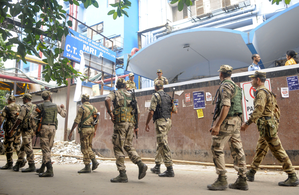CISF conducting full-scale training with Army in Kashmir, says official
By IANS | Updated: July 23, 2025 15:14 IST2025-07-23T15:06:37+5:302025-07-23T15:14:32+5:30
Chandigarh, July 23 For the first time, the Central Industrial Security Force (CISF) is conducting full-scale batches of ...

CISF conducting full-scale training with Army in Kashmir, says official
Chandigarh, July 23 For the first time, the Central Industrial Security Force (CISF) is conducting full-scale batches of training at elite Indian Army formations in the Kashmir Valley, a major step toward strengthening its operational readiness amid evolving security challenges, a senior official said on Wednesday.
According to CISF Commander Lalit Pawar, whose unit has been deployed for the security of Punjab and Haryana civil secretariats in Chandigarh, the battle-hardiness refers to preparing its personnel to swiftly and effectively respond to crises at high-value and high-risk installations such as airports, nuclear facilities, government buildings, and Parliament.
The emphasis is on handling complex, high-pressure scenarios such as drone incursions, coordinated terrorist attacks, insider threats, and sabotage operations with speed, precision, and calm. Previously, only a limited number of CISF personnel were allotted seats for such exercises.
Now, following close coordination between CISF and the Army, and in recognition of the critical national interest, the Army has agreed to provide comprehensive training modules to larger contingents. The modules include night operations, jungle warfare, close-combat tactics and endurance-building drills.
He said these modules are designed to build on CISF's already robust experience in urban counter-threat operations, while now enhancing its ability to operate in complex terrains and high-threat zones.
The goal is to equip personnel to professionally handle contingencies such as armed infiltration, sabotage, and multi-pronged terror strikes in both urban and rural environments.
He said the personnel selected for this high-intensity training are part of CISF's Quick Reaction Teams (QRTs), the first responders to emergencies across all 369 units of the force.
Only those under 35 years and who have passed the battle physical efficiency test aligned with National Security Guard (NSG) standards were eligible.
Notably, these QRT members have already completed a rigorous six-month in-house CISF training before joining the Army module, he added.
He said the CISF plans to expand this form of advanced combat training to more units, starting with the most sensitive and high-risk locations.
The aim is to gradually bring all CISF personnel to a higher threshold of physical endurance, tactical proficiency and psychological resilience, ensuring the force is always prepared to protect the nation's critical infrastructure from emerging threats. This marks a significant move to make the force "battle-ready" against unconventional and hybrid threats.
Disclaimer: This post has been auto-published from an agency feed without any modifications to the text and has not been reviewed by an editor
Open in app